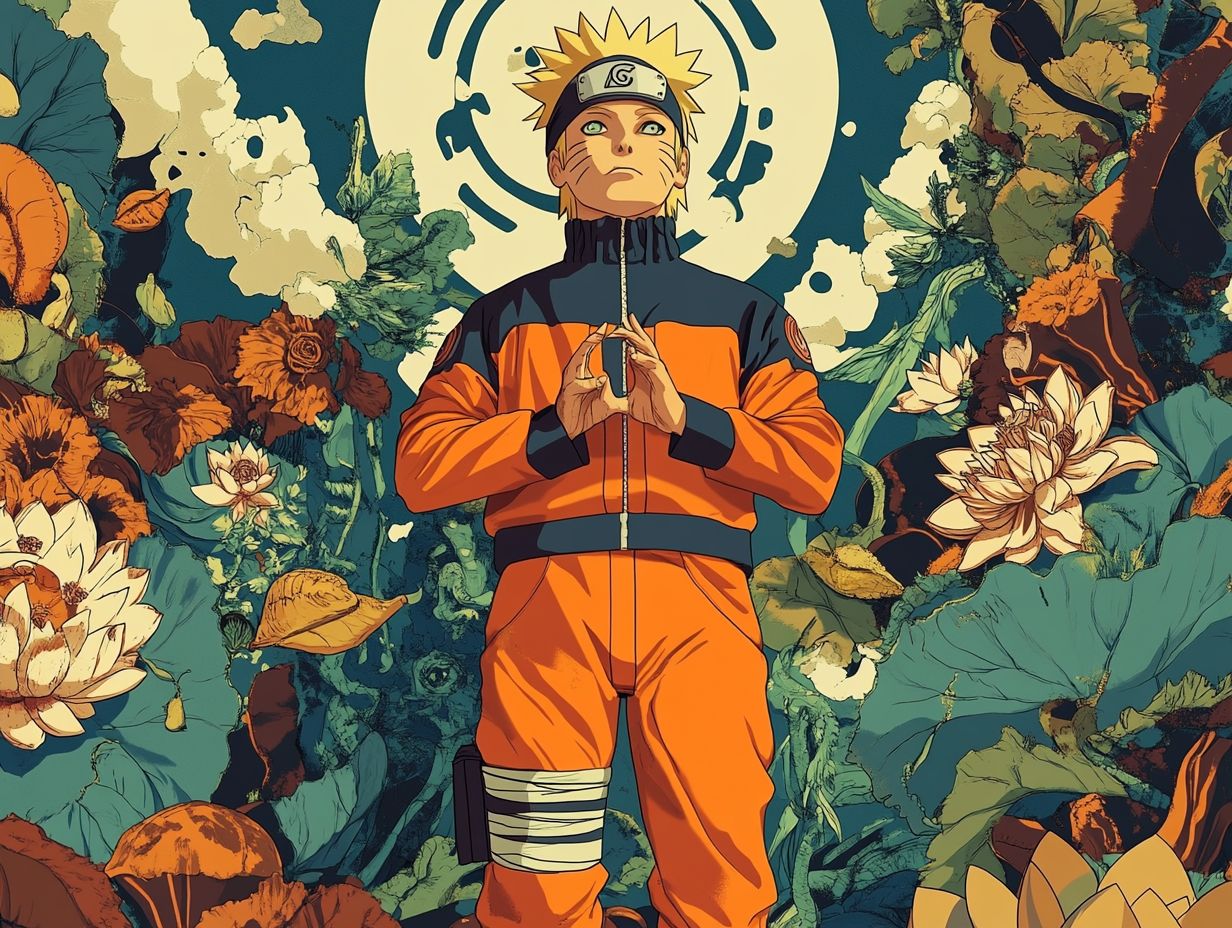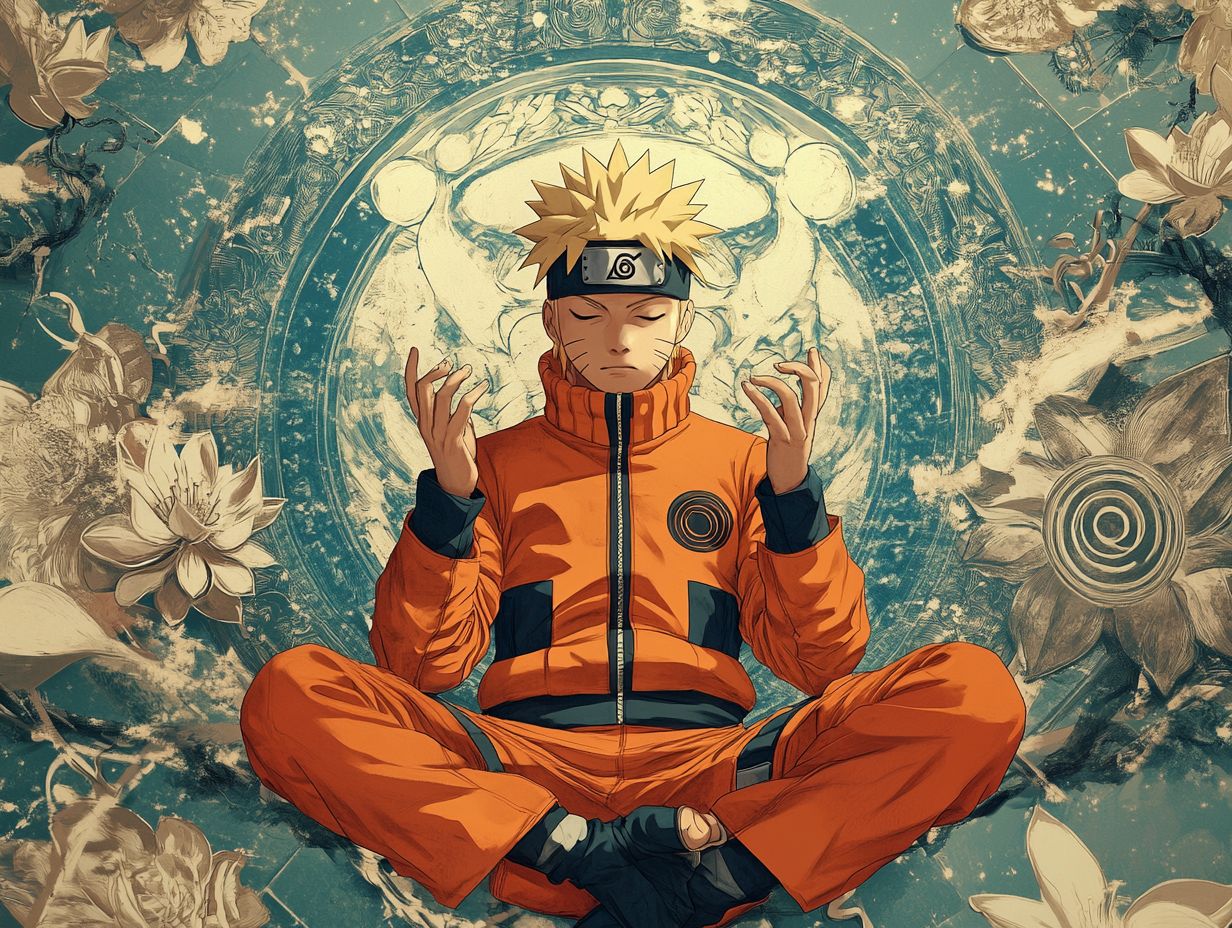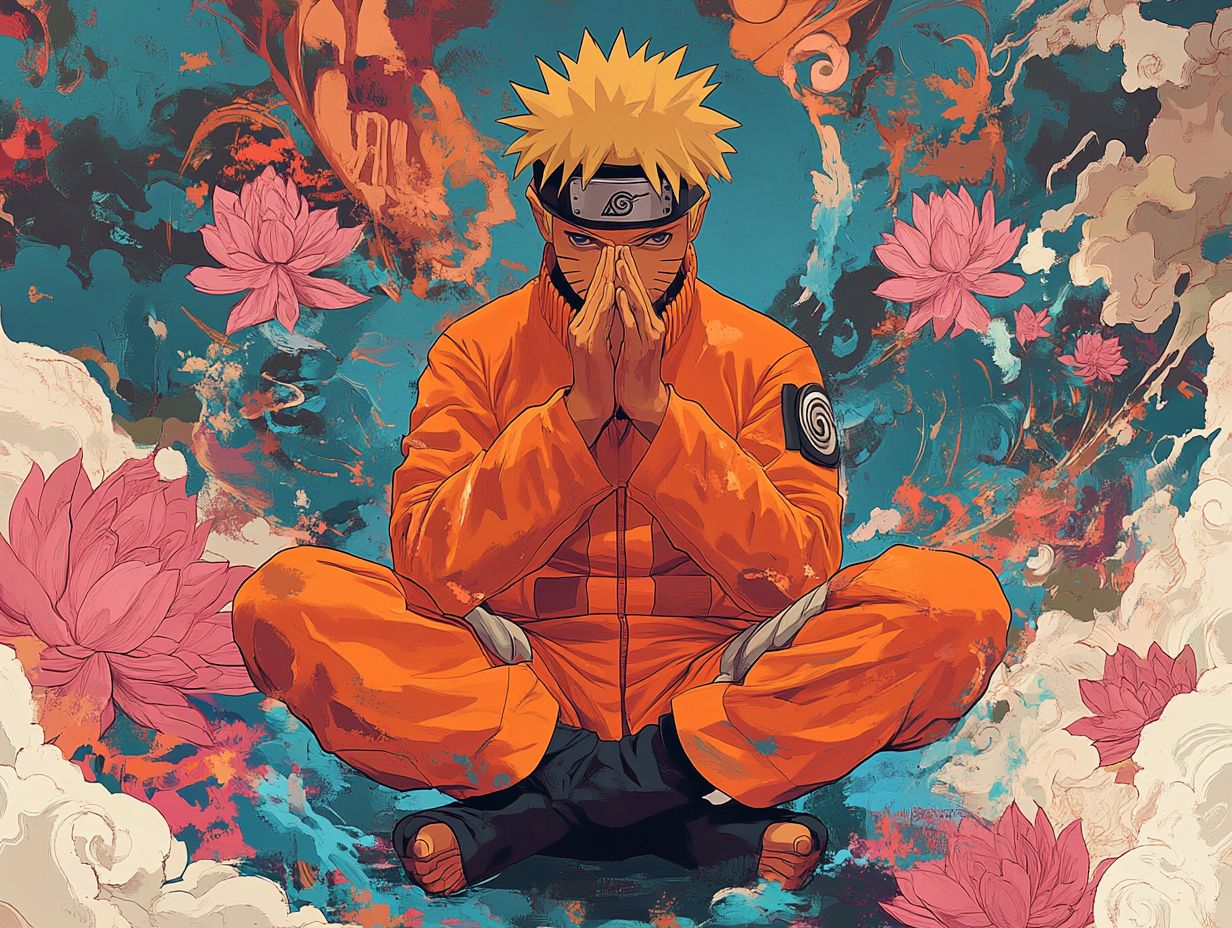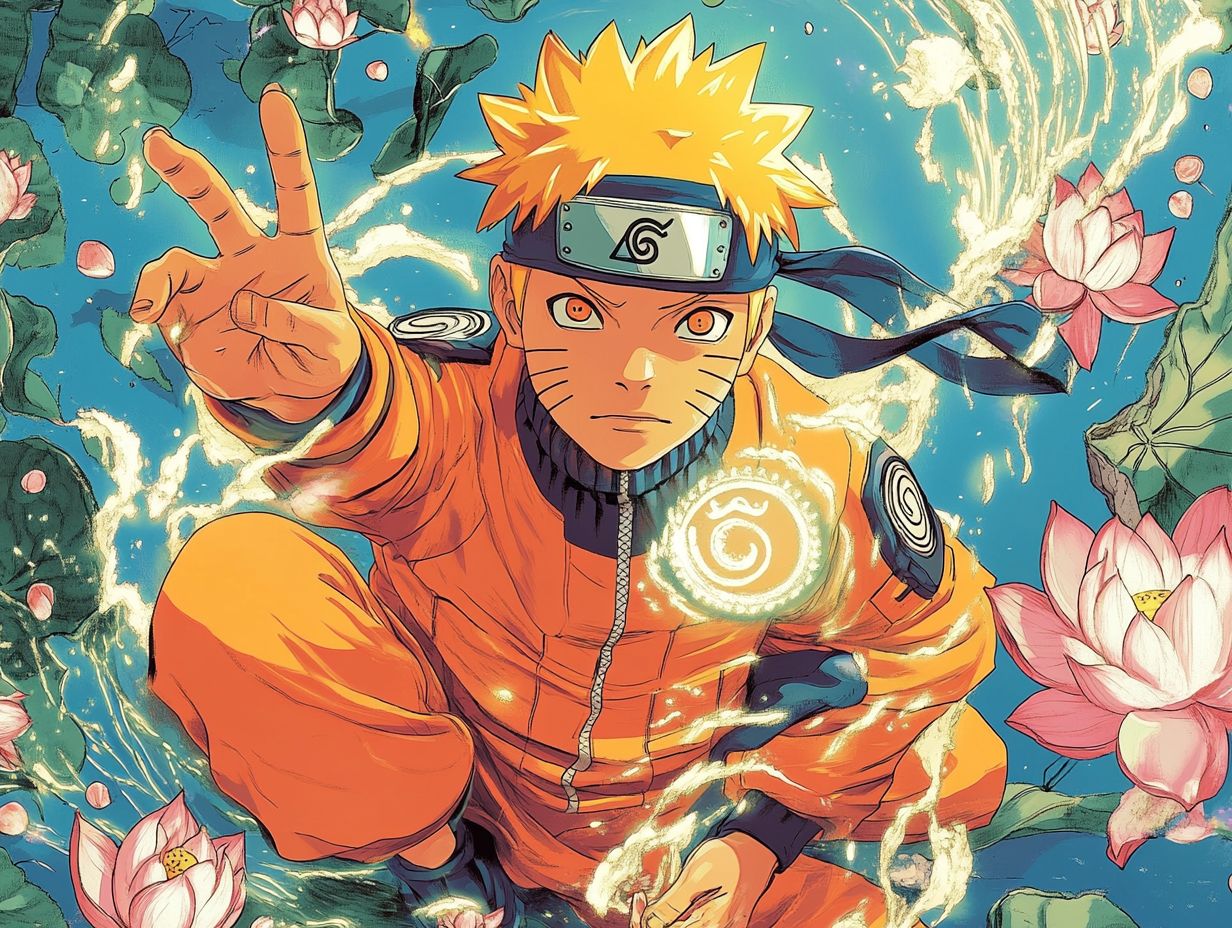Is Naruto Based on Hinduism?
The world of Naruto is a tapestry woven with intricate storytelling and vibrant characters, yet beneath its vivid exterior lies a captivating interplay of cultural influences, particularly those drawn from Hinduism and other ancient religions.
This exploration delves into how pivotal concepts such as chakra, reincarnation, and the symbolism of deities intricately shape the narrative of Naruto. It also examines the overarching themes of family, the eternal struggle of good versus evil, the hero’s journey, and the principles of karma that resonate throughout the series.
Furthermore, this analysis will highlight the significant divergences that exist between the series and Hindu beliefs, while addressing the ongoing discourse surrounding these intriguing connections.
The journey promises to reveal the profound depth of Hinduism’s influence on this cherished anime.
The Influence of Hinduism in Naruto

The anime “Naruto” is rich with mythology influences, borrowing significant elements from Indian culture and Hinduism.
The influence of Hinduism in Naruto is evident in its intricate tapestry of mythological themes, where characters such as Naruto Uzumaki, Sasuke Uchiha, and Sakura Haruno embody profound spiritual concepts including chakra, karma, and dharma. These elements reflect the rich fabric of Hindu beliefs and their spirituality.
This anime and manga adaptation deftly draws upon the storytelling traditions of ancient Indian culture, seamlessly intertwining them with the narrative styles of Japanese folklore, Shinto, and Buddhism. The result is a distinctive portrayal of conflict, friendship, and the hero’s journey that resonates deeply with audiences across the globe.
1. The Concept of Chakra
In Naruto, chakra emerges as a pivotal energy source, intricately fueling ninjutsu and amplifying character abilities, while symbolizing the spiritual essence that binds individuals to their destinies. This concept resonates with practices rooted in Hinduism, where chakra is regarded as a form of spiritual energy flowing through the human body, influencing both physical prowess and mental acuity. The use of chakra gates in the series further exemplifies this connection to spiritual and physical growth.
The relationship each character has with chakra is crucial to their journey, shaping not only their personal power but also their growth and resilience. As the series unfolds, audiences are drawn into the profound connection between mastering chakra and a character’s evolution, reflecting themes of self-discovery, spiritual growth, and the quest for balance.
This dynamic interplay between chakra and character development underscores the significance of strength while also illuminating deeper moral lessons about responsibility and the repercussions of one s choices within the intricate tapestry of power dynamics.
2. The Idea of Reincarnation
Reincarnation in Naruto reflects the Hindu concept of rebirth, demonstrating how past lives shape the actions and destinies of pivotal characters like Asura and Indra, thereby weaving karma intricately into their narratives.
This theme significantly enhances their character arcs, as individuals confront the repercussions of their previous choices, profoundly influencing their growth and moral comprehension.
Through the journeys of characters like Naruto and Sasuke, the series delves into how the struggles and triumphs of former incarnations reverberate in the present, accentuating the interplay between fate and personal accountability.
As they navigate their histories, these characters wrestle with the cyclical essence of life, illuminating essential moral teachings about forgiveness, redemption, and the capacity for transformation.
The narrative skillfully reveals that each life is not merely an isolated experience but part of a larger continuum, where the lessons gleaned can resonate through future existences in deeply impactful ways.
3. The Symbolism of Deities
The symbolism of Hindu deities such as Vishnu and Krishna in “Naruto” not only enriches the narrative but also offers profound spiritual insights into the characters’ motivations and the moral lessons intricately woven into their journeys. These divine figures serve as guiding principles, shaping the behaviors and decisions of characters as they navigate the complex realms of conflict and camaraderie. This aspect of divine inspiration reflects the epic qualities of Hindu texts like the Ramayana and Mahabharata.
For example, the ideals of selflessness and protection associated with Vishnu resonate deeply within the actions of key protagonists, motivating them to champion justice and uphold peace. In contrast, Krishna’s playful yet strategic approach to challenges often reflects the cleverness displayed in pivotal plot twists.
This interplay of divine influence complicates the binary notions of good versus evil that pervade the series, encouraging viewers to contemplate the multifaceted nature of unity, morality, and the deeper spiritual messages embedded throughout the narrative.
Other Similarities between Naruto and Hinduism
Beyond the concepts of chakra and reincarnation, “Naruto” reveals striking parallels with Hinduism, especially in its focus on family bonds, clan loyalty, and the perpetual struggle between good and evil. The series also delves into rituals and practices that echo traditional Hindu ceremonies.
These themes intricately shape the characters’ destinies and moral frameworks, weaving a rich narrative that resonates deeply with spiritual and ethical dimensions found in Hindu philosophy.
1. The Importance of Family and Clan

In Naruto, the significance of family and clan is paramount, serving as the cornerstone for character identity, relationships, and the overarching themes of loyalty and sacrifice. Throughout the series, these affiliations compel characters to confront their pasts while navigating their futures, reflecting both modern interpretation and traditional values.
For instance, the bond between Naruto and his adoptive family within the village inspires him to become the hero he aspires to be, shaping his determination and resilience. In contrast, Sasuke’s struggles with his clan’s tragic history manifest in a relentless pursuit of vengeance, catalyzing substantial character growth and profoundly influencing his choices.
Such familial dynamics are crucial in illustrating how connections shape motivations, leading to pivotal events that resonate throughout the narrative. Ultimately, these relationships underscore the profound impact of family ties on personal destiny, weaving a rich tapestry of interwoven fates and ambitions.
2. The Theme of Good vs. Evil
The theme of good versus evil is central to Naruto, manifesting through the myriad conflicts faced by its characters as they navigate their destinies, embodying the complexities of morality and individual belief systems. This theme is explored through various villains and heroes, each representing different facets of this moral spectrum.
Each character, from the relentlessly optimistic Naruto to the introspective Sasuke, reveals unique aspects of this dichotomy. Naruto s steadfast belief in redemption stands in stark contrast to Sasuke s initial descent into vengeance, illuminating the transformative journey toward understanding and self-acceptance.
Their tumultuous relationship transcends mere personal conflict; it serves as a microcosm of broader moral struggles, resonating with Hindu philosophies such as Dharma and Karma. The choices made by the characters often yield significant consequences, imparting profound lessons about the importance of one’s path and the notion that understanding and compassion can arise even from the most brutal of conflicts.
3. The Concept of Karma
In “Naruto,” the concept of karma reveals a profound belief in the direct correlation between one’s actions and their fate, intricately shaping the journeys and transformations of its characters throughout the series. This complex philosophy is vividly illustrated through various individuals who grapple with the consequences of their choices, embodying the teachings of cause and effect deeply rooted in Hindu spirituality. The series often uses mythological creatures and allegories to depict these karmic lessons.
For example, Naruto’s unwavering determination and inherent kindness illuminate his path toward becoming Hokage, showcasing how positive actions can yield rewarding outcomes. In stark contrast, characters like Pain, who personify vengeance and a thirst for destruction, ultimately encounter their own despair and loss, serving as a poignant reminder that negative intentions result in dire consequences.
These narratives reinforce the notion that every decision and action is intricately linked, resonating with the cyclical nature of karma that governs life itself.
Differences between Naruto and Hinduism
Despite the numerous cultural references, there are distinct differences in how Naruto adapts these elements compared to their traditional representations in Hinduism.
While Naruto indeed draws upon various Hindu themes, it also presents notable divergences, particularly in its depiction of religion, the application of violence, and the representation of deities. These aspects reflect a departure from traditional Hindu beliefs, highlighting the unique narrative lens through which the series interprets and adapts these cultural elements. The influence of other philosophical elements and traditions, such as Buddhism and Shinto, also contribute to these differences.
1. The Role of Religion
In the world of Naruto, religion functions primarily as a narrative device rather than a foundational principle, standing in stark contrast to the deeply ingrained traditions of Hinduism, where spirituality permeates the cultural fabric. This distinction highlights the series’ approach to cross-cultural adaptation and its focus on visual storytelling.
For instance, the concept of chakra in the series resonates with the notion of spiritual energy but is predominantly framed within a fantastical context rather than through the lens of religious doctrine. Characters frequently engage in rituals, ninjutsu, or reference myths; however, these actions are designed to enrich the plot, explore ancient texts, or foster relationships rather than to dictate moral decisions. A prime example is Naruto Uzumaki himself, whose development is profoundly shaped by his struggles, sacrifices, and friendships, rather than by any religious upbringing.
This focus on personal growth and the human experience enables the audience to forge a more relatable connection with the narrative, transcending its cultural boundaries.
2. The Use of Violence

Violence in “Naruto” serves as a pervasive theme, often employed as a dramatic device to delve into the complexities of conflict and resolution, presenting a stark juxtaposition to the predominantly non-violent philosophies inherent in Hinduism and Buddhism.
In this anime series, character arcs are frequently driven by encounters laden with aggression and rivalry, illustrating how personal histories, including those of ninjas like Sasuke and Sakura, and emotional traumas profoundly influence decisions and shape identities. The protagonists, akin to their adversaries, undergo significant evolution through battles that compel them to grapple not only with external obstacles but also with their own moral quandaries, destiny, and aspirations.
In stark contrast, Hindu teachings promote a harmonious existence rooted in the principles of Ahimsa, which underscore the importance of non-violence and compassion towards all living beings. This divergence reveals a fundamental difference in narrative styles, inviting viewers to contemplate the ramifications of violence versus the transformative power of peace and understanding in the journey of character development and spiritual growth.
3. The Representation of Gods and Goddesses
In “Naruto,” the portrayal of gods and goddesses diverges significantly from traditional Hindu representations, leaning towards a more fantastical interpretation that prioritizes narrative engagement over strict adherence to religious doctrine and mythology.
This creative freedom paves the way for a rich exploration of themes such as power, transformation, and the intricate balance between good and evil, epitomized in the character of Kaguya Otsutsuki, who embodies both divine and monstrous qualities, much like mythological creatures in ancient Indian texts like the Ramayana and Mahabharata.
Unlike the multifaceted deities of Hinduism that symbolize a myriad of natural and metaphysical principles, the representations in “Naruto” tend to favor exaggeration and mythic conflict, often through visual storytelling techniques unique to anime.
For instance, whereas Hindu gods like Shiva and Vishnu are rooted in complex philosophical frameworks, the series presents Kaguya primarily as a singular antagonist, a seemingly omnipotent threat to the world. This emphasis underscores a narrative-driven approach, prioritizing storytelling over a nuanced interpretation of religious symbolism and philosophical elements.
The Controversy Surrounding the Hinduism Influence in Naruto
The impact of Hinduism in Naruto has ignited considerable debate, as numerous Hindu organizations have voiced their concerns regarding the depiction of religious themes and characters. This has prompted an important dialogue about the nuances of adaptation within popular culture.
1. Criticism from Hindu Groups
Hindu groups have voiced substantial criticism regarding the portrayal of spiritual themes in “Naruto,” contending that the series misrepresents key concepts of Hinduism and diminishes their significance within the narrative.
These critiques frequently draw attention to specific elements, such as the concept of chakra, which some argue trivializes the profound connections that Hinduism establishes with energy and spirituality. Furthermore, the series has come under scrutiny for its depiction of deities and mythological figures like Indra and Asura, with many believing that it lacks the depth and reverence typically associated with these pivotal aspects of the faith.
This feedback reflects broader concerns regarding cultural representation in media, where creators may inadvertently strip away essential meanings to cater to a global audience. Such controversies highlight the necessity for meticulous consideration of cultural nuances in storytelling, ensuring that diverse narratives are portrayed with the respect and context they rightfully deserve.
2. The Creator’s Response
In response to the criticisms from Hindu groups, the creator of Naruto has acknowledged the influence of Hinduism while firmly maintaining that the series is a work of fiction intended for entertainment rather than a strict religious commentary. This perspective aligns with how cross-cultural adaptations can sometimes lead to different interpretations and visual storytelling methods.
This perspective illuminates the creator’s intention to weave elements from various cultures into the narrative, crafting a rich tapestry that resonates with a global audience. By integrating Hindu themes, such as the concepts of karma and dharma, the story not only captivates its fans but also provides them with a lens through which to explore complex philosophical ideas.
This blend of cultural influences reflects a thoughtful approach, showcasing how mythology can enhance storytelling and ultimately inviting viewers to reflect on their own values and beliefs within a diverse world.
Frequently Asked Questions

Is Naruto Based on Hinduism?
No, Naruto is not based on Hinduism. While the series does draw inspiration from various mythologies and religions, including Shinto and Buddhism, it is primarily based on Japanese culture and folklore.
Does Naruto contain any references to Hinduism?
Yes, there are a few references to Hinduism in Naruto, such as the character Indra being named after the Hindu god of war and weather. Additionally, concepts like karma and dharma are subtly woven into the narrative. However, these references are not significant enough to say that the series is based on Hinduism.
Are there any Hindu characters in Naruto?
No, there are no explicitly Hindu characters in Naruto. As mentioned before, some characters may have names or traits inspired by Hindu mythology, such as Indra and Asura, but they are not portrayed as Hindu in the series.
What elements of Naruto may be similar to Hinduism?
There are a few elements in Naruto that may have similarities to Hinduism, such as the concept of chakra, the idea of reincarnation, and themes of karma and dharma. However, these elements are also present in other cultures and religions, so it cannot be said that Naruto is based solely on Hinduism.
Are there any Hindu themes or messages in Naruto?
No, there are no specific Hindu themes or messages in Naruto. The series focuses primarily on themes of friendship, perseverance, and overcoming challenges, as well as moral lessons and personal growth, which are not specific to any one religion or culture.
Could Naruto be considered a representation of Hinduism in Japanese media?
No, Naruto cannot be considered a representation of Hinduism in Japanese media. While the series may contain some influences from Hinduism, such as mythological allusions and spiritual themes, it is not a direct representation of the religion and should not be viewed as such.
